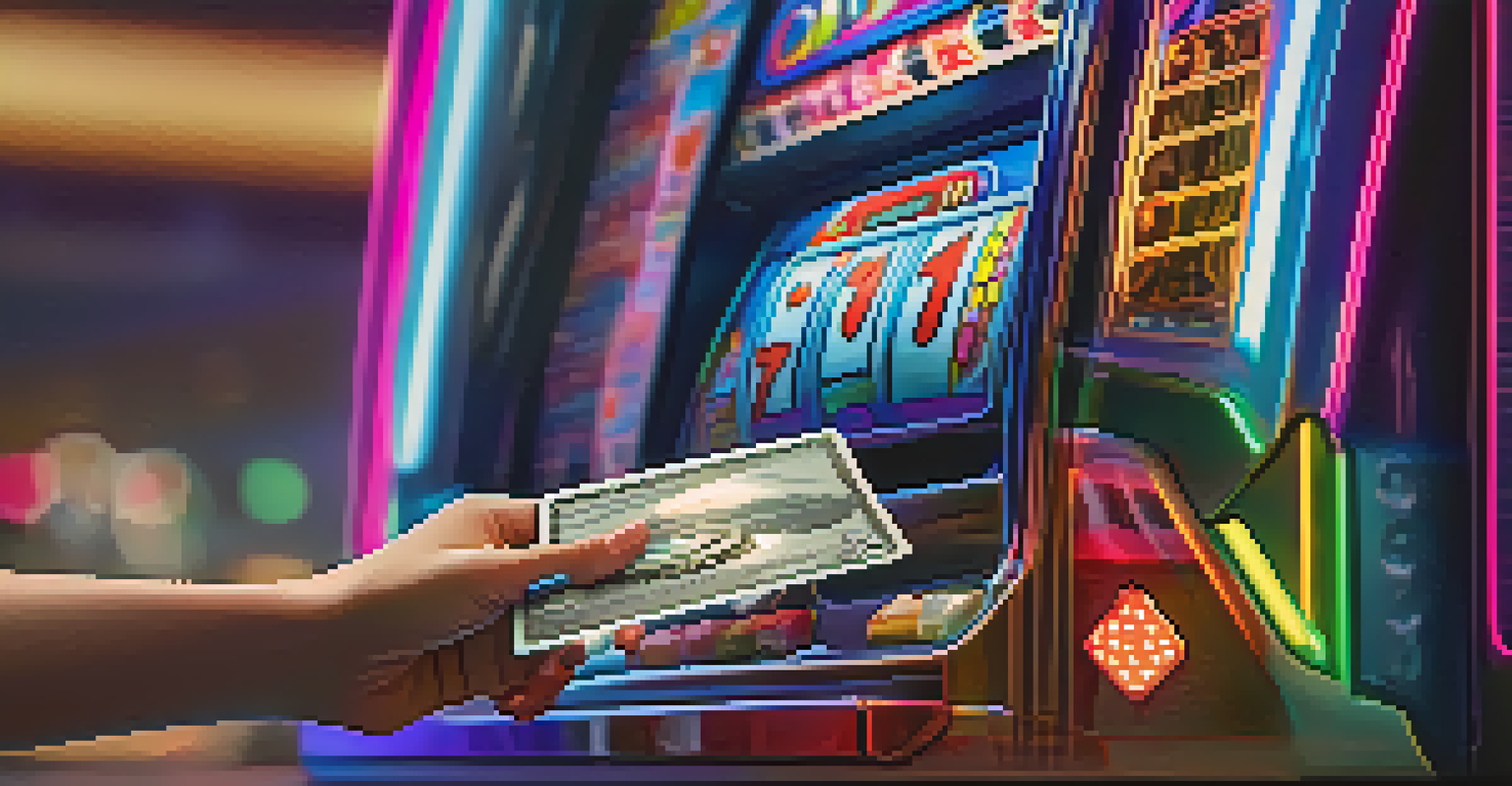The Impact of Gambling Regulations on Las Vegas Casinos

Understanding Gambling Regulations in Las Vegas
Gambling regulations in Las Vegas are designed to ensure fairness and safety for both players and operators. These rules are enforced by the Nevada Gaming Control Board, which monitors gaming activities and issues licenses. The regulations cover everything from the types of games allowed to the operational hours of casinos, creating a structured environment that promotes responsible gambling.
Regulation is not a barrier to innovation; it is a catalyst for it.
For example, casinos must adhere to strict guidelines regarding advertising and promotions to avoid misleading players. This is crucial in maintaining the integrity of the gaming industry and protecting consumers. Additionally, regulations often change in response to societal trends and issues, reflecting the evolving landscape of gambling.
Understanding these regulations is essential for anyone looking to engage with the casino industry, whether as a player or a business owner. They not only shape daily operations but also influence the overall reputation of Las Vegas as a premier gambling destination.
Economic Impacts of Regulatory Changes
Changes in gambling regulations can significantly impact the economy of Las Vegas. For instance, when new laws are introduced to expand gaming options, it can lead to increased revenue for casinos and boost local employment. This economic growth often comes with the development of new hotels, restaurants, and entertainment venues, creating a vibrant atmosphere.

Conversely, stricter regulations can place financial burdens on casinos, leading to reduced profitability and potential layoffs. For example, regulations that limit the types of games or increase taxation can deter both new investors and existing operators from expanding their businesses.
Gambling Regulations Ensure Fair Play
Regulations in Las Vegas are crucial for maintaining fairness and safety in the gaming industry, protecting both consumers and operators.
Ultimately, the economic health of Las Vegas is closely tied to the regulatory environment. A balanced approach that encourages growth while ensuring consumer protection is vital for sustaining the city’s thriving casino industry.
The Role of Technology in Regulation
Technology has transformed how gambling regulations are implemented and monitored in Las Vegas. With advancements in data analytics and surveillance systems, casinos can now track gaming activities more accurately than ever. This allows for real-time monitoring to ensure compliance with state regulations.
The best way to predict the future is to create it.
For instance, cashless gaming systems have emerged, enabling players to gamble without physical cash. This not only enhances the customer experience but also allows for better tracking of transactions, reducing the risk of fraud. As technology continues to evolve, regulators must keep pace to ensure that new gaming methods are safe and transparent.
The integration of technology into regulatory frameworks also presents challenges. Regulators need to address concerns about data privacy and cybersecurity while ensuring that innovations do not compromise the integrity of the gaming environment.
Impact on Consumer Protection and Safety
One of the primary goals of gambling regulations is to protect consumers. In Las Vegas, these regulations mandate responsible gaming practices, such as self-exclusion programs and responsible advertising. Such measures empower players to make informed decisions and help prevent gambling addiction.
For example, casinos are required to provide resources for those who may be struggling with gambling-related issues, including helplines and support services. This focus on consumer protection not only fosters trust but also enhances the overall experience for visitors.
Economic Growth Tied to Regulation
Changes in gambling regulations can significantly influence the economic landscape of Las Vegas, impacting revenue and employment opportunities.
However, the effectiveness of these regulations depends on proper enforcement and the willingness of casinos to prioritize safety over profit. A collaborative effort between regulators, casino operators, and advocacy groups is essential to create a safe gambling environment.
Regulatory Influence on Marketing Strategies
Gambling regulations significantly influence how casinos market their services. For instance, restrictions on advertising can shape the messaging and channels that casinos use to attract customers. Casinos must carefully craft their marketing campaigns to comply with regulations while still appealing to potential players.
An example of this can be seen in the promotion of casino events or tournaments, which must adhere to legal guidelines. Casinos often focus on creating unique experiences that showcase their offerings without crossing regulatory lines. This not only complies with the law but also enhances brand reputation.
As competition among casinos intensifies, the ability to navigate regulatory constraints while effectively marketing is crucial. A well-crafted strategy that respects regulations can lead to increased customer engagement and loyalty.
The Future of Gambling Regulations
As societal attitudes toward gambling continue to evolve, so too will the regulations governing Las Vegas casinos. Lawmakers are increasingly considering changes that reflect the growing acceptance of online gambling and sports betting. This shift could lead to new opportunities for casinos to expand their offerings and reach wider audiences.
Additionally, the impact of the COVID-19 pandemic has prompted discussions about how regulations can adapt to ensure safety and health in gaming environments. Innovative solutions, such as enhanced sanitation protocols and digital gaming options, may become permanent fixtures in the industry.
Technology Shapes Regulatory Practices
Advancements in technology are transforming how gambling regulations are enforced, enabling better monitoring and enhancing consumer protection.
The future of gambling regulations will likely involve a balance between innovation and consumer protection. Engaging stakeholders—including casino operators, players, and lawmakers—will be essential in shaping a regulatory framework that supports growth while ensuring safety.
Case Studies: Regulations in Action
Examining specific case studies can provide insight into how regulations affect Las Vegas casinos. For instance, the introduction of mobile sports betting has transformed the landscape, allowing casinos to reach a broader customer base. This change required careful regulatory consideration to ensure fair play and consumer protection.
Another example is the response to issues of problem gambling. Following the implementation of stronger responsible gaming measures, some casinos have reported positive outcomes, such as increased participation in self-exclusion programs. This showcases how effective regulations can lead to better player outcomes.

These case studies highlight the dynamic nature of gambling regulations and their real-world implications. By analyzing specific instances, stakeholders can learn valuable lessons that can influence future regulatory decisions.
Conclusion: The Balance of Regulation and Innovation
In conclusion, the impact of gambling regulations on Las Vegas casinos is multi-faceted, influencing everything from economic growth to consumer protection. As the industry evolves, finding a balance between regulation and innovation will be key. Stakeholders must collaborate to ensure that regulations promote a safe and enjoyable gambling environment while allowing for flexibility and growth.
The future of Las Vegas casinos will depend on their ability to adapt to changing regulations and consumer expectations. Embracing technology and fostering a commitment to responsible gaming will be essential in maintaining the city's reputation as a premier gaming destination.
Ultimately, the relationship between gambling regulations and casinos is a delicate dance that requires ongoing dialogue and adaptation. By prioritizing both regulation and innovation, Las Vegas can continue to thrive in the ever-changing world of gambling.